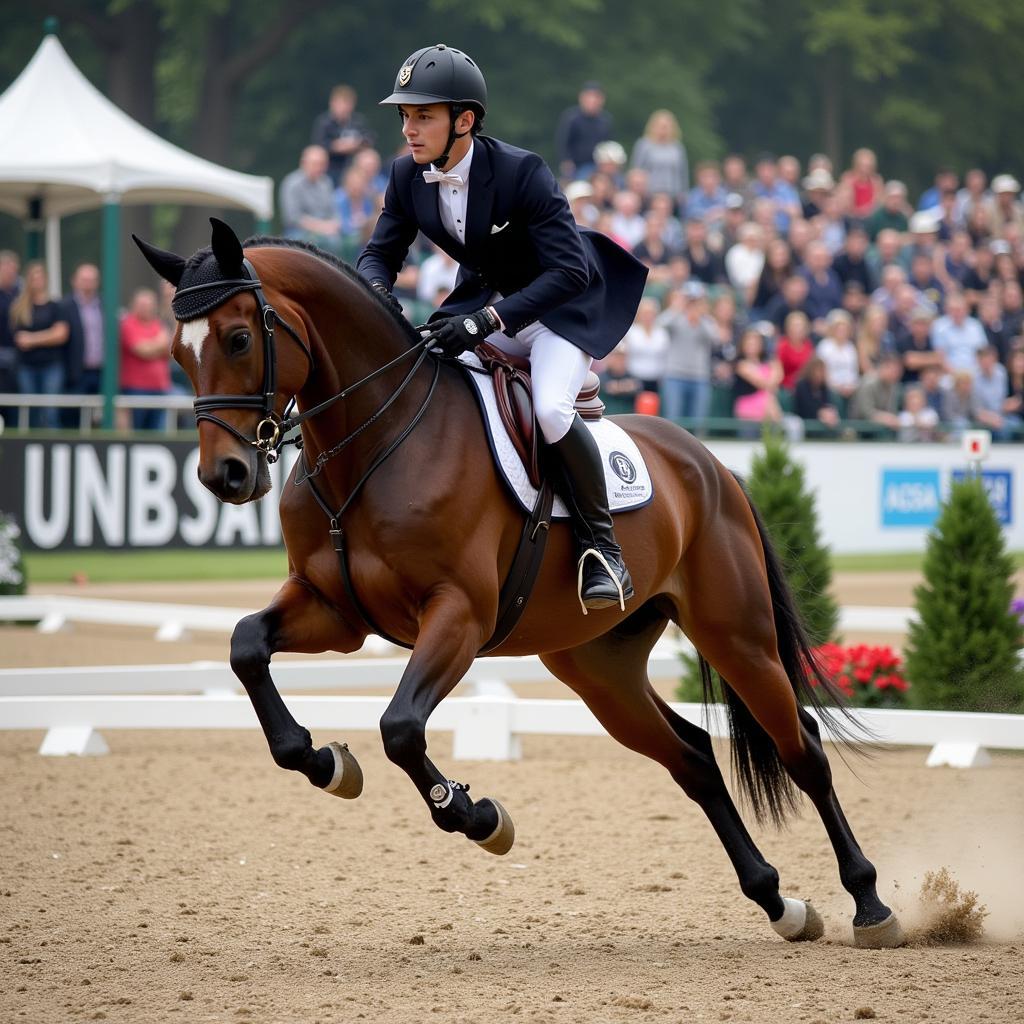Christoph Wahler, a renowned equestrian, experienced a fall from his horse, reminding us of the inherent risks involved in this demanding sport. While Wahler’s incident may be top of mind for many equestrians, falls are an unfortunate reality for riders of all levels. Understanding the causes and emphasizing safety precautions can significantly reduce the risk of falls and contribute to a safer riding experience for everyone.
 Christoph Wahler fall incident
Christoph Wahler fall incident
Common Causes of Falls in Equestrian Sports
Horse riding, while exhilarating, involves a complex partnership between horse and rider. Falls can occur due to a variety of factors, some of which include:
- Sudden Horse Movements: Horses, being prey animals, can spook easily. Unexpected noises, movements, or even changes in the environment can startle a horse, leading to sudden movements like bolting, bucking, or rearing, which can unseat a rider.
- Rider Error: Inexperience or lapses in a rider’s technique can contribute to falls. Incorrect posture, improper use of aids, or losing balance can all increase the likelihood of a fall.
- Tack Malfunctions: Broken reins, a slipping saddle, or a bit malfunction can result in a rider losing control and falling. Regular tack inspection and maintenance are crucial for safety.
- Environmental Factors: Slippery surfaces, uneven terrain, obstacles, and even weather conditions can play a role in falls.
Mitigating Risks: Prioritizing Rider Safety
While falls are a risk inherent in equestrian activities, numerous steps can be taken to minimize these risks:
- Appropriate Riding Gear: Wearing a properly fitted helmet is non-negotiable. Other protective gear like riding boots with heels, gloves, and a body protector can offer additional safety in case of a fall.
- Consistent Training: Regular riding lessons with a qualified instructor are essential for riders of all levels. Continuous learning and improving riding techniques build confidence and improve balance, seat, and communication with the horse.
- Knowing Your Horse: Understanding your horse’s temperament, potential triggers, and body language is crucial. A strong bond based on trust and clear communication can help anticipate and manage unexpected behaviors.
- Pre-Ride Inspections: Before each ride, riders should conduct thorough tack checks to ensure everything is in good working order. Inspecting the riding area for potential hazards is also essential.
Learning from Falls: Christoph Wahler’s Experience
Even experienced riders like Christoph Wahler experience falls. Analyzing these incidents, understanding contributing factors, and learning from mistakes can improve safety protocols within the equestrian community. Openly discussing falls, sharing experiences, and supporting fellow riders contribute to a culture of safety and awareness.
Conclusion
Falls are an unfortunate reality in the equestrian world, but proactive measures can significantly reduce their occurrence. By prioritizing rider education, appropriate gear, and meticulous safety checks, we contribute to a safer environment for both horse and rider. Remember, safety is a continuous journey of knowledge, awareness, and responsible riding practices.
FAQs
1. What should I do if I fall off a horse?
The most important thing is to assess yourself for injuries. If you can, move to a safe location away from the horse. If you or anyone else is seriously hurt, call for medical help immediately.
2. How can I help my horse if it gets spooked easily?
Desensitization training can help horses become accustomed to various stimuli. Working with a qualified trainer can help address your horse’s specific anxieties and build their confidence.
3. What type of helmet is best for riding?
Look for a helmet that meets ASTM (American Society for Testing and Materials) or other internationally recognized safety standards. It should fit snugly and be properly fastened.
4. Do I need to wear a body protector?
Body protectors are highly recommended, especially for young or inexperienced riders, and during activities with a higher risk of falling, such as jumping or cross-country riding.
5. How can I learn more about horse riding safety?
Taking riding lessons from a certified instructor, joining equestrian organizations, and accessing reputable online resources can provide valuable information and support your journey towards safe and enjoyable riding.
For personalized advice and support in your equestrian journey, contact Justus Horses USA at 0772127271, email us at [email protected], or visit our farm at QGM2+WX2, Vị Trung, Vị Thuỷ, Hậu Giang, Việt Nam. We have a dedicated team available 24/7 to assist you with any queries or concerns.